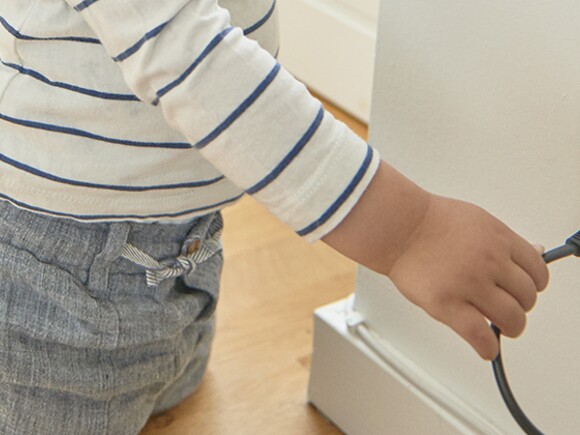As a loving and attentive mother, ensuring the health and well-being of your child is always a top priority. One crucial aspect of your child's overall health that demands special attention is their dental care. Developing good habits early on sets the foundation for a lifetime of healthy smiles.
From their very first tooth to their teenage years, each stage of your child's dental development requires specific care and attention.
In Baby&Me, we'll delve into vital topics such as proper brushing and flossing techniques, the importance of regular dental check-ups, healthy dietary habits for optimal oral health, and how to address common dental concerns that may arise during your child's growth.
By following our children's dental care checklist, you'll not only safeguard your child against dental issues but also instill in them the importance of maintaining good oral hygiene habits for a lifetime.
Why Is It Important to Take Care of Your Children’s Dental Health?
Establishing good oral hygiene habits early on can significantly reduce the risk of dental problems such as cavities, gum disease, and tooth decay.
By teaching your child to brush and floss regularly and scheduling routine dental check-ups, you can catch any potential issues early and address them before they escalate into more significant problems.
Poor dental health in childhood can lead to more severe health issues later in life, including heart disease, diabetes, and respiratory problems. By prioritizing your child's dental health now, you set them on a path to enjoy better overall health and well-being throughout their lives.
In essence, taking care of your children's dental health is not just a matter of aesthetics; it's a fundamental aspect of their overall health and happiness.
Essential Children's Dental Care Checklist
Maintaining your child's dental health requires a proactive approach and consistent effort. Use this comprehensive checklist to ensure you're covering all the essential aspects of your child's dental care routine:
Brushing Daily
Encourage your child to develop a thorough brushing routine by using a soft-bristled toothbrush and fluoride toothpaste.
Teach them the proper technique, emphasizing gentle circular motions to clean all surfaces of their teeth and gums effectively. Ensure they brush for a full two minutes each time, both in the morning and before bedtime.
Flossing Daily
Introduce your child to the importance of flossing to remove food particles and plaque from between their teeth and along the gumline.
Show them how to use dental floss or floss picks gently, guiding the floss between each tooth with a sawing motion. Emphasize consistency in this practice, ideally performed once a day, usually before brushing.
Healthy Eating Habits
Promote a balanced diet rich in essential nutrients for optimal dental health. Limit sugary snacks and beverages, which can contribute to tooth decay.
Encourage your child to choose nutritious options such as fruits, vegetables, whole grains, and dairy products, which provide essential vitamins and minerals for strong teeth and gums.
Regular Dental Check-ups
Schedule biannual dental check-ups for your child with a trusted pediatric dentist. These routine visits allow the dentist to monitor your child's oral health, identify any potential issues early on, and provide professional cleanings and fluoride treatments to maintain dental hygiene.
Limiting Thumb Sucking and Pacifier Use
Discourage prolonged thumb sucking or pacifier use beyond infancy to prevent potential dental issues such as misalignment of teeth or palate changes. Offer positive reinforcement and alternative comfort methods to help your child break these habits gradually.
Lead by Example
Serve as a positive role model for your child by demonstrating good oral hygiene habits in your daily routine. Brush and floss together as a family, showing your child the importance of prioritizing dental health and making it a fun and interactive experience.
Emergency Preparedness
Equip yourself with knowledge and resources to handle dental emergencies effectively. Familiarize yourself with basic first aid procedures for toothaches, knocked-out teeth, or other dental injuries, and keep essential contact information for your dentist readily available in case of emergencies.
Consistency, education, and proactive measures are key to promoting healthy teeth and gums from an early age.

Red Flags in Your Children's Dental Health
As a vigilant parent, it's essential to be aware of potential signs and symptoms that may indicate underlying dental issues in your child.
Early detection and prompt intervention can prevent dental problems from worsening and ensure your child maintains optimal oral health. Here are some red flags to watch out for:
- Persistent toothaches or sensitivity to hot, cold, or sweet foods and drinks may indicate tooth decay, infection, or other dental problems. Pay attention to any complaints of discomfort from your child and seek dental evaluation if pain persists.
- Swollen, red, or bleeding gums can be early signs of gum disease, also known as gingivitis. Gingivitis left untreated can progress to more severe gum disease and lead to tooth loss. Monitor your child's gum health and consult with a dentist if you notice any abnormalities.
- Foul-smelling breath in children may signal underlying dental issues such as tooth decay, gum disease, or oral infections. Proper oral hygiene practices and regular dental check-ups can help address the root cause of bad breath.
- Discoloration or staining of teeth, particularly dark spots or brown patches, may indicate decay or enamel erosion. Consult with a dentist to determine the cause of tooth discoloration and appropriate treatment options.
- Persistent sores, ulcers, or lesions in the mouth can be signs of oral infections, oral thrush, or other underlying health conditions. If your child experiences recurrent mouth sores or lesions, seek medical or dental attention for proper diagnosis and management.
- Habitual teeth grinding or clenching, also known as bruxism, can lead to dental problems. Discuss any concerns about teeth grinding with your child's dentist, who may recommend interventions such as a nightguard to protect their teeth.
Being proactive in identifying and addressing red flags in your children's dental health is essential for maintaining their overall well-being and preventing potential complications.
If you notice any of these signs or symptoms, don't hesitate to seek professional dental evaluation and treatment for your child.
SOURCE:
https://www.nhs.uk/live-well/healthy-teeth-and-gums/taking-care-of-childrens-teeth/
https://www.cdc.gov/oralhealth/publications/features/childrens-dental-health.html
Join
Get full access to expert-backed nutrition support
Nutrition
Learn about nutrition at your own pace
Nutrition experts
Contact our nutritionists at any time to answer your main questions about nutrition
Tools
Try our tailored practical tools





















